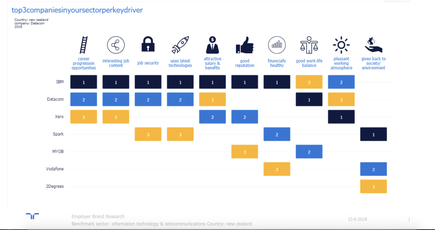ICT is fastest growing sector, but not necessarily top of mind as employer
- 26 June, 2018 09:00

Information and communications technology is the fastest growing and third biggest industry in New Zealand, but this success does not necessarily translate to being top of mind choice as a place to work for by Kiwi employees.
The 2018 Randstad Employer Brand Research finds education and training is the most attractive industry (36 per cent), followed by professional services and public services (33 per cent) in joint second, with information technology and telecommunications coming in third (31 per cent).
The ICT figure is even down by 1 per cent from the previous year, maintaining its position as the fourth most attractive sector to work for.

Randstad says 3757 total people in New Zealand were surveyed as part of a global employer branding research, with over 175,000 respondents in 30 countries.
“New Zealand remains an incredibly tight market in terms of ICT talent,: says Ian Scott, client solutions manager at Randstad New Zealand.
“Our Randstad Employee Brand Research shows that while ICT remains an attractive industry, there is still more work to be done to ensure employers remain competitive to avoid losing high calibre candidates to other industry sectors.”

The research finds the public sector, meanwhile, is one of the biggest winners, rising from sixth to third in the list.
The biggest losers were media which moved from third spot to seventh; and banking and financial services which shifted from seventh to 10th of the 17 industry sectors featured.

Not surprisingly, the ICT sector scored highest among industries surveyed for use of latest technology.

It came in second in terms of salary and benefits, and and third in ‘pleasant work atmosphere’.

Keeping skills relevant
“Perhaps surprisingly, we also saw from this year's research that less than half of Kiwis are prepared to keep their skills up to date to stay employable, and only a third of us are prepared to bring fresh ideas and suggestions to our workplaces.”
“These are concerning figures, and even more so when combined with our research from 2017 which showed us that only 12 per cent of the population were worried that automation would take their job away.”
“Employees working in ICT were the strongest supporters of automation with half of ICT professionals believing that automation would make their job better,” says Scott.
He says the 2018 data would suggest lower educated and blue-collar workers are more inclined to favour more training.
“This could be to combat the impacts of technology that are perhaps most visible in that sector today,” he states.
“Our view is that white-collar workers will experience an even greater impact of automation, AI and RPA in the very near future, and we are pretty sure they are not ready or at least are not sure how to prepare for this inevitability. “

Future-fit in the changing world of work
Scott says the survey finds at least 30 per cent of Kiwis are looking to change roles in the next 12 months, citing issues like limited career paths, insufficient challenges and low compensation and work-life balance.
“Employers need to get ahead of this now if they want to retain their best people,” he says.

“Employees are looking at their current employers to see how they are preparing for change,” he adds. “We are seeing that those organisations who are communicating openly with their staff are maintaining high engagement and retention.”
“Organisations need to work harder to demonstrate to potential employees that they offer benefits like job security and work-life balance. It’s these attributes that are engaging to employees right now and attracting job seekers.”
“If Kiwi companies want to continue to compete globally, they will need to lift productivity, reduce costs as we see a continued squeeze on margins, which will mean hiring for and training the skills for the future now,” he points out.
“Progressive CEOs are taking the necessary steps to support the parts of their workforce who are most vulnerable to the impacts of technology, acknowledging this openly and supporting their people's career development. Whether that be to benefit their own organisation or another.”

Get the latest on digital transformation: Sign up for CIO newsletters for regular updates on CIO news, career tips, views and events. Follow CIO New Zealand on Twitter:@cio_nz
Send news tips and comments to divina_paredes@idg.co.nz @divinap

